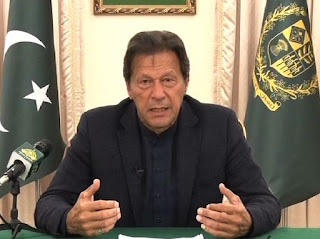The danger of not extending the lockdown
By Omar R Quraishi
The anti-lockdown lobby is led by the Prime Minister himself
– he has repeatedly said that he is against a nationwide lockdown because that
would, according to him, kill more people from poverty than the coronavirus
itself. In fact, in a special short address in English addressed to the rest of the world, the PM said that like other countries, Pakistan was trying to contain the spread of the coronavirus and manage the economic impact of the disease, but its biggest challenge was to prevent people dying from hunger in Pakistan.
 |
| Pakistan Prime Minister Imran Khan -- File photo |
At the same time, as recently as April 8, the PM has
said: It is a misconception that
this pandemic is spreading slowly in the country as the number of our deaths
has been low so far and it will not spread rapidly; it will become worse in the
days to come.
The question is that does
he really expect people, who routinely flout lockdown orders and consider it to
be a holiday, to voluntarily practice social distancing? Clearly, that is not
going to happen.
The logic of a lockdown
is quite simple – it is to flatten the curve, so to speak – to spread out the
number of infections over a longer period of time so that the more severe cases
which need hospitalization and care in an ICU and a ventilator are spaced out. A lot of testing must also accompany a lockdown because that allows the infection to be traced, isolated, and once that is done, it makes it all the more possible to break the transmission and contain the spread. We have seen that in the lockdown so far, this has not happened and Pakistan was able to conducted around 61,000 tests (approximately 280 for every million of its population). In South Asia, this is the highest average by far but still very low. The federal and provincial governments did not have enough test kits to begin with and supplies are slow to come by still - a daily testing rate of over 20,000 is expected by the end of April.
Extensive testing is absolutely necessary and ideally should have accompanied the lockdown when it began. Furthermore, social distancing is key but given the experience of Pakistan so far, it appears that it may have to be enforced - and hence this reinforces the need for a proper lockdown. In the absence of social distancing, as has been since in many parts of Punjab and even Sindh, infections will spiral and flood the country’s healthcare system – we have seen how that played out in Italy, Spain, France and the US – and is still playing out there – and these countries have the best healthcare systems in the world.
 |
| Drive-through testing for the coronavirus in Karachi |
Extensive testing is absolutely necessary and ideally should have accompanied the lockdown when it began. Furthermore, social distancing is key but given the experience of Pakistan so far, it appears that it may have to be enforced - and hence this reinforces the need for a proper lockdown. In the absence of social distancing, as has been since in many parts of Punjab and even Sindh, infections will spiral and flood the country’s healthcare system – we have seen how that played out in Italy, Spain, France and the US – and is still playing out there – and these countries have the best healthcare systems in the world.
However, in the first
three, data suggests that the spread of the virus is slowing and that they may
have reached their peak – the US is expected to peak in the coming week – the
lockdown imposed by many states along with social distancing measures has
brought a revision in the predicted estimated deaths from 100,000-240,000 to
60,000 by August. Agreed, even this figure is tragically high, but one can only
imagine what it would be in the presence of no lockdown and no social distancing.
With the Pakistan government’s
plan to provide Rs 12,000 a month to 12 million families (at a cost to the
taxpayer of Rs 144 billion), and assuming that this is done effectively through
the BISP/Ehsaas programme, the valid concerns about the most vulnerable being the
hardest hit economically will have been mitigated to a considerable extent. Add
to this the measures announced by the State bank of Pakistan to help small businesses
in their payroll costs, and hundreds of private organizations and NGOs that
have come forward to provide rations and essential items and these can also
been seen as actions that will help the most financially vulnerable segment of
the population.
Does the PM really
think that once the lockdown is eased post April 14, coronavirus cases won’t spiral out
of control so much so that the ICUs of all government and private hospitals
will be swamped?
As of April 12, it had 5,183 and increasing rapidly in recent days. If a lockdown is eased, the number of cases are likely to increase at a much faster rate -- something that the country's health minister also publicly said for the first time in a press conference on April 11 (going against the anti-lockdown policy of his boss, the PM).
And then Pakistan doctors
will be forced to make the kind of painfully excruciating choices that doctors
in Italy, Spain, France the US have done in deciding who is put on a ventilator
and who is to be left out?
The whole objective of a lockdown
is precisely to avoid such an agonizing situation.
The writer is a journalist and CEO of Positive Media Communications based in Karachi, Pakistan




Comments
Post a Comment